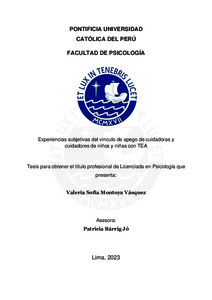Experiencias subjetivas del vínculo de apego de cuidadoras y cuidadores de niños y niñas con TEA
Abstract
El presente estudio tuvo como objetivo explorar las experiencias subjetivas del cuidado
y vínculo cuidadora-niño en cuidadores con niños con TEA, desde la perspectiva teórica del
apego. Se realizó una investigación cualitativa con enfoque fenomenológico, en la que se
utilizó el método de análisis temático para indagar en las experiencias de participantes y apego
cuidadora-niño. Se entrevistó a 7 cuidadores de niños con TEA, dos papás y cinco mamás. Sus
niños tenían entre 3 y 7 años y todos ellos asistían a terapia para su condición. Los resultados
se dividieron en tres temas: Interacciones diarias y contacto físico, Experiencias de juego y
apoyo a la exploración y Ser fuente de calma y seguridad. En cuanto a los hallazgos, todos los
cuidadores describieron interacciones cálidas con sus niños que podían dar indicios de un apego
seguro. Por un lado, se mencionan muestras de afecto físico y búsqueda de proximidad durante
actividades lúdicas y situaciones de angustia por parte del niño. Por otro lado, se recalca
involucramiento, calidez y promoción de autonomía de parte de los cuidadores. Se plantea la
necesidad de continuar investigando sobre el tema y contribuir con información sistematizada
en esta población. The purpose of this study was to explore subjective experiences of care and caregiverchild bond in caregivers for children with ASD (Autism Spectrum Disorder), from the
theoretical perspective of attachment. Qualitative phenomenological research design was
conducted, and a thematic analysis was used to inquire on the experiences of the participants
and parent-child attachment. Seven caregivers for children with ASD were interviewed, two
dads and 5 moms. The children were around the ages of 3-7 years-old and all of them were
receiving therapy for ASD. Results were divided in three topics: Daily interactions and physical
contact, Play experiences and support to exploration, Being a source of calmness and safety.
The findings showed that all caregivers described positive interactions with their children,
which could indicate a secure attachment style. In addition, physical displays of affection and
proximity-seeking during play activities, and distress from the child, were mentioned by the
caregivers. On the other hand, involvement, warmth, and autonomy support from the
caregivers, were also discussed. Overall, the results raise the need to further study this topic
and contribute with systematized information in this population.
Temas
Apego
Padres e hijos--Relaciones
Autismo infantil
Padres e hijos--Relaciones
Autismo infantil
Para optar el título de
Licenciado en Psicología
Collections
The following license files are associated with this item:






